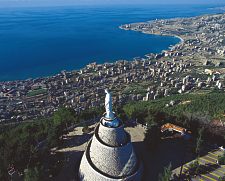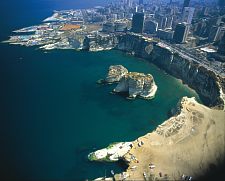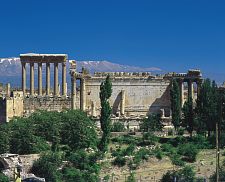|














| |
Say NO to War in Lebanon
The Center for Democracy in Lebanon
May 15, 2008
[PRINT
IN PDF]
The armed confrontations that took place in Lebanon starting on May 6, 2008
presented a grave situation reminiscent of the 1975 civil war, and thwarted
peaceful efforts to reach a breakthrough in the political stalemate that plagues
the country since December of 2006.
As we express our deepest grief and sympathy for the families of the deceased
and the wounded of all sides and our dismay at the wanton destruction of
civilian property and organizations, we strongly condemn the use of arms to
resolve any political conflict in Lebanon. The Lebanese people have suffered
enough wars, mayhem and oppression over the last 30 years and it is time they
have peace.
In previous declarations, we have consistently affirmed the need for democratic
and civil reform in our government. Many of our recommendations have already
been implemented. However, several deadlocks remain in the face of progress
towards a neutral, secular and democratic Lebanon, in peaceful coexistence with
its neighbors.
Whereas throughout the political debate over the last 3 years, the focus has
been mostly on the international tribunal and the rights of the opposition to
have its share of political power in the government, be it a say in electing the
president or the policy of the future cabinet;
Whereas the Israeli war on Lebanon in 2006, provoked by Hezbollah, has generated
a lot of sympathy and support for the latter among the Lebanese population and
pushed to the back burner discussions over the necessity of Hezbollah’s arms;
Whereas the political gridlock has generated tension on the grounds and the
Council of Ministers under PM Siniora has made little to appease these tensions
and instead adopted unilateral decisions that prompted retaliatory measures from
the opposition;
Whereas Hezbollah under the banner of the opposition has taken its arms to the
streets of Beirut and Mount Lebanon in May 2008 and in contravention to the
national consensus on the role of these arms and in an attempt to force a
solution to the political stalemate – under the rubric of defending the security
of the militia;
Whereas Hezbollah’s use of force in Beirut and Mount Lebanon has substantiated
fears that other militias have illegally retained medium and heavy weaponry, and
has accentuated a simmering sectarian strife that threatens to plunge the
country in a new civil war;
Whereas the citizens of Lebanon have suffered enough poverty and wars in their
recent past only to become hostages of leadership failure at all levels of
government, embargoed from a peaceful and normal life;
We stand in shock by recent events and hold those involved in the public affairs
of Lebanon accountable, namely all the armed groups responsible for the lives
lost, the blood spilled and the properties destroyed over the last week in
Lebanon, and the political parties and religious leaders responsible for the
collapse of the national dialogue and for dragging the country into a civil war.
Specifically, we hold Parliament under the leadership of Speaker Berri
accountable for its failure to fulfill its legislative duties, including:
1) Failure to elect a President of the Republic within the constitutional time
limits and until now.
2) Failure to provide any legislative oversight for the Cabinet of PM Fouad
Siniora, using the excuse of illegitimacy.
3) Failure to provide a democratic and peaceful forum to debate policies and
much needed reforms.
We also hold the Council of Ministers under the leadership of PM Siniora
accountable for its failures to fulfill its constitutional, political and
executive duties within the framework promulgated in the constitution,
including:
1) Failure to live up to the constitutional guarantee of fair and balanced
communal representation in any governmental body.
2) Failure to reach out and work with the opposition to build consensus for
implementation of its agenda.
3) Failure to respond constructively to the basic economic and social needs of
the people.
4) Failure to secure the country and the population in the aftermath of the July
2006 war and in May 2008.
5) Failure to maintain the appearance of fairness in its handling of executive
matters.
To diffuse tension on the ground, we propose the following immediate steps:
All leaders must support the Army’s effort to disarm all illegal
militias and groups that engaged in the confrontations of last week.
The opposition must remove all roadblocks, end the civil disobedience and
remove the camp from Downtown Beirut as these actions have not yielded
any positive outcome for the opposition let alone for the populace at large.
Although we welcome well-intended foreign mediations, we reject all calls
for foreign intervention in the Lebanese internal affairs be they diplomatic or
in the form of an Arab deterrent force, which in the recent past
intensified the conflict and prolonged it for 30 years under Syrian tutelage.
All involved parties must resume dialogue. The agenda of any
reconciliatory dialogue must include a serious and open discussion of the role,
the necessity and legitimacy of Hezbollah’s arms in light of recent
developments. Hezbollah’s military wing has now been engaged against other
Lebanese to leverage the party’s political agenda in what resembled a military
coup. This has put new emphasis on an anomaly that must be resolved. The
role and the political control of Hezbollah’s arms must be a priority of any
future dialogue.
It is absolutely necessary that Hezbollah agree to disarm in principle and in a
peaceful manner. Hezbollah’s main argument for armament has been deterrence and
defense against Israeli assault that otherwise cannot be handled by the Army.
Israel’s constant threat, provocation and military incursions along with its
continuous detention of Lebanese prisoners and occupation of the Lebanese Shebaa
farms are specific examples often cited in justification of Hezbollah’s arms. To
address these concerns, a viable national defense strategy must top the
priorities of any dialogue. This strategy must rebuild confidence
between the Resistance Movement and the state, concentrate the war decision in
the hands of the central government, restore coordination between legitimate
armed forces, maintain readiness for self defense and assimilate Lebanese
resistance fighters under an exclusive national banner.
Any serious dialogue over Hezbollah’s arms must consider the
status of the armistice with Israel and engage in an open and free debate on the
best strategy to resume peace negotiations between an independent
Lebanon and the state of Israel. Unless and until the state of war with Israel
has ended, and the Lebanese citizens feel secure from any Israeli threats to
their safety, there will always be claims of legitimate resistance and the need
for arms. The traditional government line and the rhetoric adopted by the
current cabinet that Lebanon will be the last Arab state to negotiate peace with
Israel is strategically amiss and does not serve our national interest.
Finally, we call upon all Lebanese to join our call to:
1) Pledge not to resort to violence to leverage political position.
2) Avoid sectarian and confessional overtones in political rhetoric.
3) Abide by the constitution and stand for the constitutional institutions even
in the quest for change.
4) Work together on defining a list of national priorities that ensure for the
citizens of Lebanon peace, security and prosperity.
|